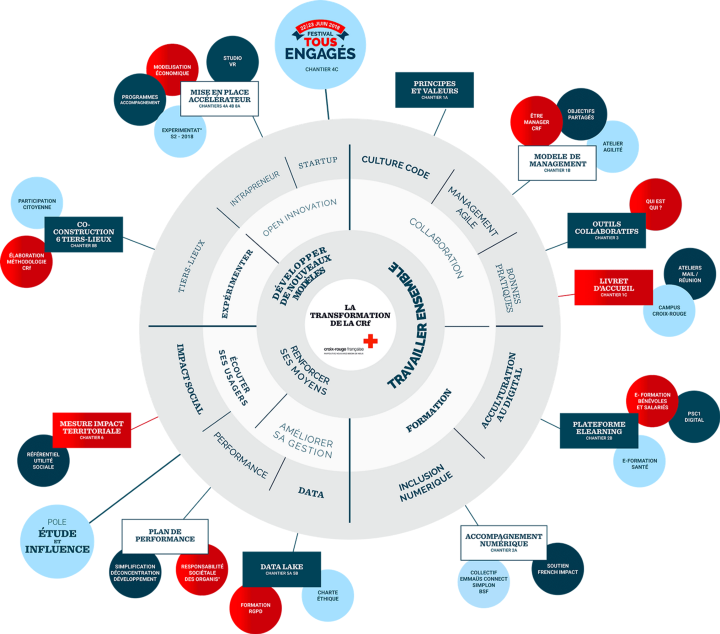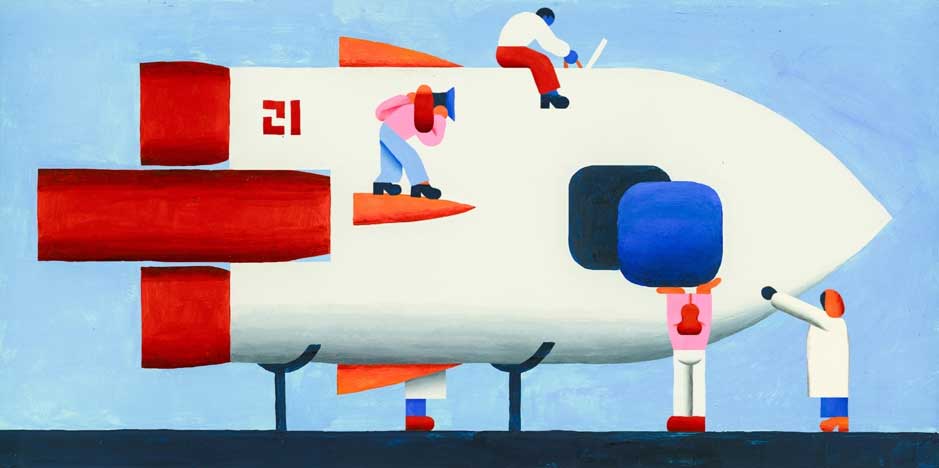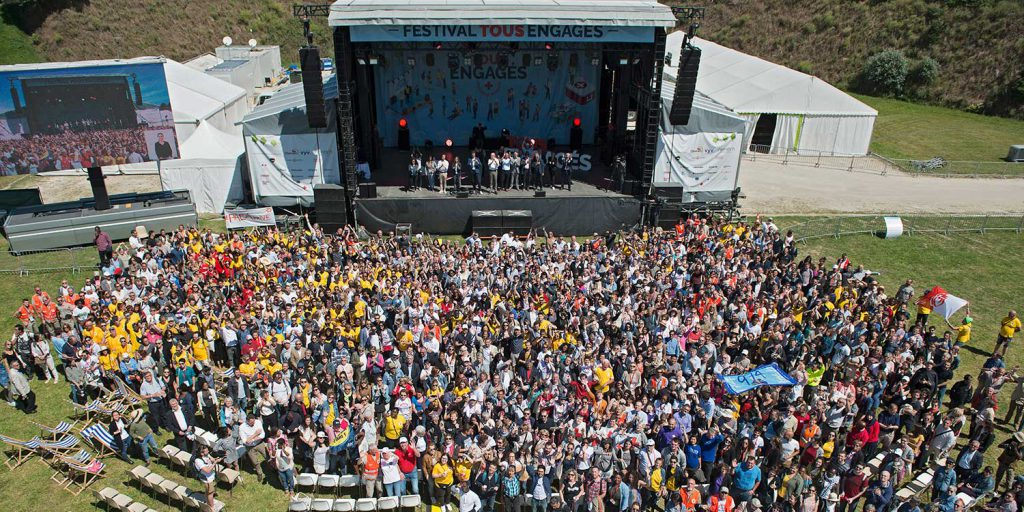Disponible en: Anglais
French Red Cross’ Transformation & Innovation Strategy: an example of organisational change
While the State faces more difficulties to guarantee quality public services for all, social needs are constantly increasing. This is why it is more urgent than ever for non-profit organizations, such as the French Red Cross, to support those that might be vulnerable and to strengthen civic participation. In order to fulfil these commitments and to develop new solutions, these actors have the duty to transform themselves to be more fit for contemporary and future contexts.
As the historical and reference actor in the field of social, medico-social, health, emergency and humanitarian sectors, the French Red Cross monitors the acceleration of the social needs in France and internationally, as well as new social challenges in different areas: digital, environment, education, isolation, migration, etc. At the same time, the economic balance of non-profit organizations is weakened by the erosion of public subsidies, the stagnation and transformation of public generosity, by the increased competition with new players as well as by the increasing focus on immediate and tangible results required by donors and investors.
Associations have to deal with new legal constraints, ethical requirements and transparency as well as the evolution of new forms of engagement. Volunteering becomes more punctual and focuses more and more on a defined project whose usefulness must be immediate.
Finally, the digital revolution creates opportunities through the appearance of new tools, actors and models. At the same time, it poses new challenges, such as the need to continually adapt, to put innovation at the service of the development of volunteers and employees, and to place people at the heart of the organization, with the only goal of strengthening the social impact of the French Red Cross.
To meet these challenges, the French Red Cross has been implementing an ambitious strategy of transformation since 2017. Time and technologies change, but the aim has not changed: to provide the best solutions to the social needs of people in vulnerable situations.
Focused on the human rather than the technology, this strategy is articulated around three main axis:
1 | Work together adopting a culture of an agile organization.
2 | Strengthen social impact by better listening to users and improving its management.
3 | Open to new models and actors experimenting and associating.

1 | WORKING BETTER TOGETHER
Our transformation starts with adopting an agile culture of organization, to be able to act “anywhere and anytime”, strengthening the positive social impact of the French Red Cross. This requires building a strong common culture and ensuring workplace well-being, giving the means to each volunteer and employee to adapt to change, to give a contemporary meaning to the mission and to the historical values of the association, to promote cooperation and to allow everyone to learn and engage.
A. Renew the associative project
The so-called ‘associative project’ is the fundamental principles, strategy and guidelines of the organization. It presents the values that connect volunteers and employees and the project of transformation of society carried by the association.
These guidelines of the French Red Cross were reviewed in 2009. In the 10 years since, the association has experienced significant changes and its environment has evolved considerably. In 2019, the associative project brings together all its components to define the positioning of this “new Red Cross”; the direction of the development and of the actions for the upcoming ten years.
The new associative project aims for several objectives:
- give meaning to the action, recalling the reasons, values and objectives of the transformation and the development in the different activities of the French Red Cross,
- strengthen the unity of the organization by providing a frame of reference and affirming its strategic priorities,
- improving the governance model, to be simpler and more effective in the service of the development strategy,
- clarify the identity and the services offered by the French Red Cross in order to encourage commitment and reinforce its influence, by explaining its values, its global social utility.
B. Caring for volunteers and employees
In order to give the best work conditions to the actors of the French Red Cross, the association is investing massively in its improvement. Since 2017, the French Red Cross has invested more than 10 million euros per year in the renovation of its local units and in the renewal of its vehicles.
To value and attract new human resources, volunteers and employees care is a priority throughout their whole career. With regard to employees, an HR strategy has also been put in place to increase low wages.
2019 includes a substantial new social project, in particular to recruit new talents at the French Red Cross.
C. Create a national program of social inclusion through digital transformation
In 2018, nearly 14 million people declared themselves struggling with digital transformation in France. While the digitalisation of administrative procedures has become widespread, the internet has become necessary to access employment. Digital social networks also play an important role in everyone’s sociability. It is essential for the Red Cross to take part in the reduction of the digital divide.
As a member of the French Impact group, composed of Emmaus Connect, WeTechCare, Simplon.co, Libraries Without Borders & the National Neighbourhood Association Liaison Committee, the French Red Cross contributes to an open innovation dynamic in order to establish a national program for social inclusion through digital technologies. This initiative has received 1 million euros to join the platform Les Bons Clics in order to become the reference platform for digital caregivers, regardless of their status.
The deployment of the platform will support the increasing digital inclusion activities of volunteers and employees of the French Red Cross, and the strengthening of the technological equipment of the different structures of the association, thanks to the initiative Croix-Rouge Insertion.

D. Modernising the e-learning offering and developing a digital acculturation pathway
Enabling each person the means to acquire a solid digital culture is a necessary condition of any digital transformation and innovation process. The “digital revolution” has a strong impact on the evolution of the ways of working, studying, exchanging, creating and sharing. We believe it is essential to support the French Red Cross stakeholders in this learning experience, by spreading training in digital acculturation, at the same time through face-to-face and e-learning solutions.
It is also important to make the existing training offer of the French Red Cross more accessible, within the organization and modernizing it. To this end, the French Red Cross is implementing a common e-learning platform gathering up-to-date content. The First Aid Training e-learning module (PSC1) run by French Red Cross, will be the first module to be developed and implemented online, closely followed by modules on well-being at work and digital acculturation.
E. Adopt cooperation and performance as a management culture
It is essential to design and deploy within French Red Cross, a management culture based on the principles of transparency, collegiality, responsibility and autonomy.
This project responds to the need to make the French Red Cross capable, everywhere and at any time, to best respond to unforeseen events and complex social needs by simplifying decision-making processes, encouraging everyone’s initiatives and facilitating cooperation between the various actors of the French Red Cross.
This new common foundation will contribute to the establishment of mechanisms of autonomy and continuous improvements, initiatives, independence and quality of life at work.
F. Create a Red Cross Campus to facilitate cooperation, openness, training and creation
On October 15, 2018, the French Red Cross moved its headquarter from Paris to the Red Cross Campus, in Montrouge. This building reflects the image of the organization: a platform of interactions, a place of experimentation & innovation, a national & international showcase and a resource center for our network.
This new common house fully meets the requirement of exemplarity of the association. Indeed, the Red Cross Campus now drastically reduces its energy footprint and guarantees to its employees working conditions that comply with regulations.
Finally, the Campus allows the French Red Cross to be cost efficient by reducing the total building area while increasing workspaces, and by opening up the old headquarters in Paris for public rental.

2 | STRENGTHENING OUR SOCIAL IMPACT
Strengthening our social impact means first and foremost listening to our users. This involves valuing and analyzing data, in order to better understand social needs, and measuring the impact of the actions taken. It is also about optimizing the means of the Red Cross by deploying a strategy of economic performance, organizational social responsibility (OSR), and by developing the promotion of its values.
A. Achieving efficiency: a national measure of social Impact
As a major player in the social economy, it is essential for the French Red Cross to demonstrate its capacity to generate social added value. In this sense, the French Red Cross aims to extend the measure of its social impact to all its activities and to the entire territory. This involves the development of a methodology, benchmarks and global indicators by business, in order to increase the coherence and the homogeneity of the approach as well as its development. These tools allow at the same time to better control its activities and to create a culture of continuous improvement.
Social impact measurement is also a tool of comparison to identify strengths and weaknesses, progress, and to create global dynamics of transformation of the sector. More generally, this tool enhances the visibility and the legitimacy of the organization towards its public and private partners by allowing greater transparency of its actions.
B. Developing secure and efficient data management
The effectiveness and autonomy of the organization cannot be ensured without judicious, efficient and secure management of personal data, especially following the standards of the General Data Protection Regulation (GDPR).
Because the French Red Cross is a trusted actor for the populations it supports and, for the organizations with which it cooperates, the association is committed to setting up a framework that allows everyone to share their data, beyond the regulatory obligations of the GDPR. In order to provide this service safely, it establishes a code of ethics and a training program on data management and security for its members.
At the same time, the French Red Cross is exploring the analysis of its data, also linked to public data, in order to better adapt its services to social needs in the territories.
C. Towards more social responsibility and ethics
As the historical and reference social actor in the country, the French Red Cross is developing its strategy of organization social responsibility. It pushes for strong obligation in terms of social, educational and environmental impact. Following an assessment mission, the French Red Cross has a proactive policy of raising awareness, prevention and action so that everyone can scale up good practices, and that the organizational social responsibility (OSR) applies effectively on the whole network and territories.
In 2018, the French Red Cross also adopted an Ethics and Scientific Committee. Its first mission is to draft a Code of Ethics to prevent any behavior opposed to the values of the association. It will inform the decisions of the Board regarding the Principles and Values of the International Red Cross and Red Crescent Movement.
At last, internal control and risk management have been strengthened to ensure the integrity of the French Red Cross’s activities.

D. Transforming the financing of French Red Cross
The scarcity of public funding and the erosion and transformation of the generosity of the public force the French Red Cross to rethink its business models and collection channels to strengthen its autonomy and ensure its sustainability.
After taking ambitious measures to turn around its operations and accelerate the optimization of its support functions, the association is currently implementing a performance, simplification and development plan. This involves the management of debt of the association and the creation of new financial management tools, for better resourcing the organisation. In addition, the French Red Cross is working to diversify its financial resources, notably through the creation of a real estate subsidiary and the setting up of a crowdfunding platform.
Finally, the association analyses the economic models of each of its priority areas in order to strengthen its autonomy, improve the quality of service and enhance its value to its users.
E. Strengthening the positioning and influence of the French Red Cross
In order to clarify the role of the French Red Cross in society, three lines of communication are favoured:
> A balanced, effective and accountable Red Cross towards its funders (donors, government authorities, partners, sponsors, etc.),
> A substantial Red Cross evaluation of the inventory of its actions. The aim is to highlight the diversity of its activities and to develop advocacy actions on major contemporary humanitarian and social causes, while remaining in line with the founding values of the Movement.
> A Red Cross integrated into humanitarian action and the social economy: volunteers and employees are the stakeholders of a common project, united under one emblem. The final aim is to reach out to local actors, who are constantly in contact with citizens, and to elected representatives, public institutions and partners, so that our strategy spreads throughout the world and throughout all the segments of the society.

3 | OPENING TO NEW ACTORS AND MODELS
Meeting the challenge of innovation is about acting for the benefit of the broadest number of people. For this purpose, non-profit organizations should be inspired by the new models introduced by the social and solidarity economy, whether in terms of financing (economic models), action (mixed audiences) and decision-making (governance including beneficiaries).
A. Opening to social innovation : Le Festival Tous Engagés
Organized last June 22 and 23, the Festival Tous Engagés was conceived to open and share the innovation strategy of the French Red Cross. With more than 5,000 participants, the Festival represented a time of cohesion and exchange for all the members of the French Red Cross and for the French actors of the social innovation. The event counted more than 30 conferences and debates on topics such as civic engagement, volunteering and social innovation, while nearly 180 social innovation projects, launched by the Red Cross and the ecosystem of the social and solidarity economy, were presented at the Village du Festival.
This milestone marked the official launch of the French Red Cross’s social innovation strategy. It proved that we can innovate and reinvent ourselves in an ever-changing environment. The Festival has enabled the French Red Cross to find the inspirations and reflections necessary to implement innovations aimed at strengthening the social impact.

B. Creating 21, the accelerator of social innovation of the French Red Cross
Through the launch of 21, the French Red Cross invests in grassroots ideas of its volunteers, employees and partners. It supports their development, building on their deep understanding of community needs, an unprecedented expertise in health, social, medico-social training and crisis management, and a commitment to humanitarianism and its universal values.
21, the Accelerator of Social Innovation, hosts an intrapreneurship program for French Red Cross employees and volunteers keen to develop a project within our organization, and an entrepreneurship program to help small social enterprises, big companies, associations and startups to test and deploy their solutions in our health, medico-social and social network. On the one hand, we will be able to participate in the research and development of innovative medico-social solutions and, on the other hand, to acquire these solutions (products, services, applications, etc.) in order to revive our processing equipment.
21 will also include :
- a social code academy in partnership with Simplon, hosting classes of coding to facilitate the social inclusion through the web development,
- a laboratory of immersive technologies that will develop virtual reality scenarios in the areas of health, exclusion and first aid,
- a social coworking space to host social enterprises in order to create an integrated ecosystem.
C. Empowering our cooperation with the International Movement of the Red Cross and the Red Crescent
The French Red Cross is one of the five founding societies of the International Federation of the Red Cross and Red Crescent, forming the world’s first humanitarian movement with the ICRC.
In a context of growing number of conflicts, massive population displacements, dramatic consequences of climate change and profound changes in humanitarian intervention methods, the French Red Cross is strengthening its cooperation and its position within the Movement.
This action is possible through
- Positioning the French Red Cross as an international platform for social innovation within the Movement,
- Developing common advocacy strategies on major international issues (migration, climate change, etc.),
- Becoming more involved in the Movement’s governance and international coordination to better respond to the challenges of each country and the restriction of global funding,
- Designing new models of humanitarian intervention to adapt to the evolution of major contemporary and transnational issues (capacity building, pooling of resources).
D. Positioning the French Red Cross as a reference actor in disaster risk reduction, resilience and protection of populations
In order to take on the challenges of adapting to climate change (disasters, climatic migration, epidemics, heat waves, etc.), the French Red Cross aims to be a key player in the response to climate change, the major public health threat of the 21st century.
Thus, it deploys an innovative strategy of disaster risk reduction, strengthening of resilience and the protection of populations (reinforcement of state-of-the-art expertise in crisis preparedness and response, health care assistance for populations and public powers, support for vulnerabilities).
In 2019, on the occasion of 100 years of the International Federation (IFRC), the French Red Cross organizes a global conference “Health and climate change – Taking care of humankind at +2°C” which brought together more than 400 international experts and operational actors for a “Humanitarian Community of Practice”. The objective: bring together scientific researchers, share the latest innovations in climate change adaptation and resilience, and mobilize citizens, public and private decision-makers.
E. Anticipating the future of the social action model in the territories
To reinvent its role in the territories and maximize the social impact of its actions, the French Red Cross is experimenting with new forms of interventions.
Since 2017, the association has been developing five “third-places”, spaces dedicated to social life, community connection and civic experience, bringing together different types of activities, actors and publics. Hybrid, inclusive and economically sustainable, these versatile places are located in rural and peri-urban areas where social needs are growing.
In addition, the French Red Cross is working on developing an ambitious strategy to develop its textile business already carried by more than 15,000 volunteers in more than 900 locations in France. In order to better respond to the ecological and social challenges of our time in a context of increased competition, the French Red Cross is :
- Maximizing the social impact of the existing activities in order to reaffirm the commitment of the French Red Cross across the country,
- Including isolated territories, ensuring the sustainability of the economic model of local units by increasing the revenue generated,
- Promoting the circular economy and drastically reducing the textile waste.
Would you like to know more about the future projects of the French Red Cross? Follow the stories published by the Innovation and Strategy Direction of the French Red Cross on Medium and LinkedIn.
Disponible en: Anglais
0 commentaires